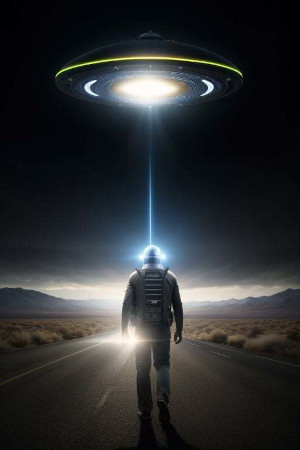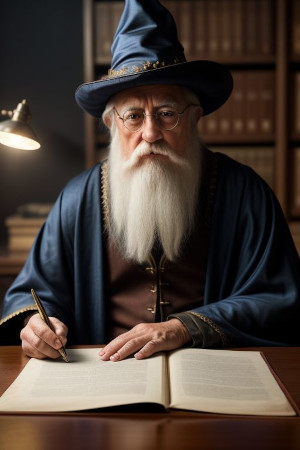2013
Aug
05
Are You a Writer or a Storyteller?
OK, I admit it. If you are reading this post then you are probably a writer in the sense that you sit at a keyboard much of the time casting your thoughts in binary on a hard drive. But what I mean by "writer" here is something more specific.
A writer is someone for whom the intricacies of grammar are second nature, who knows precisely when to use an ellipsis and when to use an em dash, who hasn't made a spelling error since fourth grade. More to the point, a writer is a person who uses language like a paintbrush to convey meaning as a form of beauty.
Consider two examples of a hastily constructed moment from a nonexistent story:
As if driven by the shimmering curtains of light overhead, the arctic cold pierced through even his heaviest furs, biting callously into his flesh even as the wind whistled a song of death. Like a gluttonous vampire, it sucked away any warmth, reaching its fangs to the very core of his soul. Already, his left foot, after that clumsy misstep into the stream, was at once numb and burning. His toes seemed to have already gone, and by the morning, if he survived, they likely would have.
Compare that with:
The aurora was pretty, but the weather was so cold that he could feel it even through his furs, and the wind blew constantly. He was shivering so hard that it felt like his life was leaking out. Because he had been clumsy and gotten his left foot wet in the stream, it was especially cold, and he was afraid that he might lose his toes.
I am not claiming either to be a prosaic masterpiece,but it's my opinion that the first example is more colorful and better conveys the mood of the moment, whereas the second was designed to be merely a bland statement of fact. This distinction is much of what I mean by the word writer. An artist whose medium is words.
On the other hand, there is the storyteller, that person who creates realistic and believable characters, those whom you come to love or hate, whom you want to meet or murder, and places them in situations that leave your heart thumping and your mind reeling until the very last page. The one who has you jumping at a campfire and leaving the reading light on all night until it is time to leave for work.
Writing and storytelling. Most people are somewhat better at one than at the other.
Hemingway and King
Ernest Hemingway is credited as having been a great American writer, and I will have to concur. With a palette of simple words, he paints a descriptive and breathtaking scene. The following almost Faulker-esque marathon sentence from A Farewell to Arms impressed me with its effective setting of mood:
People lived on in it and there were hospitals and cafes and artillery up side streets and two bawdy houses, one for troops and one for officers, and with the end of the summer, the cool nights, the fighting in the mountains beyond the town, the shell-marked iron of the railway bridge, the smashed tunnel by the river where the fighting had been, the trees around the square and the long avenue of trees that led to the square; these with there being girls in the town, the King passing in his motor car, sometimes now seeing his face and little long necked body and gray beard like a goat's chin tuft; all these with the sudden interiors of houses that had lost a wall through shelling, with plaster and rubble in their gardens and sometimes in the street, and the whole thing going well on the Carso made the fall very different from the last fall when we had been in the country.
 Yes, I admire Hemingway's writing, but I didn't really care for A Farewell to Arms. I didn't care for "Hills Like White Elephants." I didn't care for The Old Man and the Sea. Collectively, they pretty much cured me of reading Hemingway because they all left me feeling like the end the world was yesterday and I was the only one left. As you probably know, he suffered from depression and eventually committed suicide, and I sometimes wonder if he was trying, through his writing, to depress the rest of the world as well.
Yes, I admire Hemingway's writing, but I didn't really care for A Farewell to Arms. I didn't care for "Hills Like White Elephants." I didn't care for The Old Man and the Sea. Collectively, they pretty much cured me of reading Hemingway because they all left me feeling like the end the world was yesterday and I was the only one left. As you probably know, he suffered from depression and eventually committed suicide, and I sometimes wonder if he was trying, through his writing, to depress the rest of the world as well.
In my analysis, Hemmingway was a spectacular writer, but not such a storyteller.
And then there is Steven King. Now don't get me wrong; he's not a bad writer, but there isn't so much about the way he writes that stands out in my mind. It's what he writes. Unless you've missed something for the last few decades, you know he can tell a tremendous tale. Funny thing about King, I either love him or hate him. Firestarter, It, and The Shining were all amazing. Storm of the Century and Pet Sematary were were just unpleasant. But either way, he cranks out impressive and gripping stories by the dozens. What Hemingway lacks in storytelling, King makes up for.
So Which Are You?
You have probably been running through the back of your mind the question, "Which one am I?" I speculate that because I've been doing it myself. I figure that I'm not as good a writer as Hemingway, and not as good a storyteller as King, though I was a winning essayist in college and have had people swoon over my stories. (I might have also had them retch; if so, they haven't told me.) So I must be at least an acceptable balance between the two.
But there is nothing to say that you can't excel in both. As a demonstration, allow me to present what should be one of the most famous paragraphs in literature:
Maycomb was an old town, but it was a tired old town when I first knew it. In rainy weather the streets turned to red slop; grass grew on the sidewalks, the courthouse sagged in the square. Somehow, it was hotter then: a black dog suffered on a summer’s day; bony mules hitched to Hoover carts flicked flies in the sweltering shade of the live oaks on the square. Men’s stiff collars wilted by nine in the morning. Ladies bathed before noon, after their three-o’clock naps, and by nightfall were like soft teacakes with frostings of sweat and sweet talcum.
Yes, that is a couple of pages into Harper Lee's To Kill a Mockingbird, and which, if memory serves, is quoted at the beginning of the film. It has all the descriptive and mood-setting power of Hemingway, and the story is one of the best ever told.
Perhaps Lee is my model as the ideal example of both.















Comments
There are no comments for this post.
You must be logged in to post a comment.